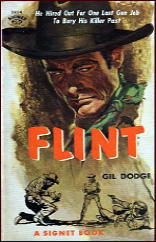Fri 9 Nov 2012
A Western Review by Dan Stumpf: GIL DODGE [ARNOLD HANO] – Flint.
Posted by Steve under Reviews , Western Fiction[5] Comments
GIL DODGE – Flint. Signet #1414, paperback original, 1957. Included in 3 Steps to Hell as by Arnold Hano, Stark House, softcover, October 2012, along with So I’m a Heel and The Big Out.

Flint offers some fine Western characters and a terse, hard-boiled opening, but ultimately it’s more interesting for the story behind it than the story within.
Arnold Hano, the editor-in-chief at Lion Books back in the 1950s ought to be legendary for the quality of the work he sustained. While not every Lion Book was a classic of its time, Hano gave work to writers like Jim Thompson, Robert Bloch, David Goodis and Richard Matheson when they needed it most. And he didn’t just give them work, he gave them free rein to indulge their pulpy passions on the printed page.
Books like The Kidnaper, The Killer Inside Me, The Burglar and Someone Is Bleeding teem with genuine artistry inside their gaudy covers that would be admirable anywhere, and simply amazing inside a cheap paperback.
So when I learned that Hano himself wrote a western based on Jim Thompson’s Savage Night (with Thompson’s blessing) I came to it with high expectations — maybe too high. It starts well, with Flint, a notorious Hired Gun, previously lung-shot and in hiding, making his painful way across barren countryside to keep a rendezvous with a mysterious cattle baron named Good who needs a job done right—very close to the same situation the tubercular Charlie Biggers walks into in Savage Night.
And in short order, Flint finds himself working a run-down ranch with his intended target, a rancher named Thomason (get it?) romancing a buxom wife and playing cat-and-mouse with Good’s henchman and a slovenly sheriff.
And then [SPOILER!] everything just kinda stops as Flint gets sucked into an elaborate, nay byzantine, game with the man who hired him, trying to figure out his place in the scheme of things and the roles and motives of the various other players. Every move Flint makes, Good has seen coming, everything he tries gets him nowhere, or leads him to where Good has figured he’d go… and nothing really happens as several chapters go by with Good’s schemes getting more complex and Flint’s efforts more futile.
Okay now, maybe this is a personal thing with me, or maybe it’s the vision and talent of the writers in question. I’ll entertain both possibilities, but in Savage Night, Jim Thompson conveys the notion of a cruel and mocking universe through which his doomed characters must wander.
And this to me was more compelling — more convincing, even — than Arno/Dodge’s picture of a nasty old man cooking up murderous plots just for the fun of seeing folks squirm. I guess the difference is that Thompson’s characters do battle with nightmares while Arno/Dodge’s simply grasp for the banal — and find it all too readily within their reach.
November 9th, 2012 at 11:41 pm
James Reasoner also reviewed this book on November 2 on his blog, ROUGH EDGES. He liked it quite a bit and found it enjoyable. It’s interesting to compare the two reviews.
November 9th, 2012 at 11:54 pm
Just to make things easier for everyone, here’s a direct link to James’s review:
http://jamesreasoner.blogspot.com/2012/11/forgotten-books-flint-gil-dodge-arnold.html
November 10th, 2012 at 2:24 am
A very interesting review. I want to correct one detail: “Cassidy’s Girl” was a Gold Medal Book.
November 10th, 2012 at 11:41 am
Dan Stumpf is right that the difference of the plot is important for the inferior quality of Hano’s novel. In “Flint” the culprit seems to act like a spider in its web controlling every move of the entangled victim. This is a typical plot of a suspense novel. On the contrary in “Savage Night” the almighty gangster boss seems to be a fantastic vision of a hired killer who becomes more and more insane at the end of the story. This is a rather unusual plot.
November 11th, 2012 at 12:50 am
Josef, #3
After conferring with Dan, he’s suggested changing CASSIDAY’S GIRL to THE BURGLAR. Thanks for catching that faux pas on both our parts, his and mine.
— Steve